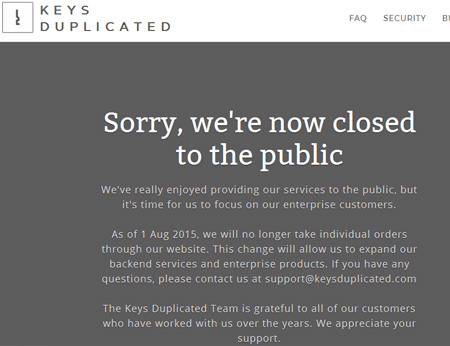5 Terrifying Truths About The Crappy Lock On Your Front Door

There is a whole career field whose sole purpose is to get inside any of our homes or cars at any time. We're talking about locksmiths, of course (also: ninjas), and it's not exactly a freaky profession. Unless you really, really think about it. And we did. Then we sat down with Harvey from Australia and Caleb and Jim from the United States. They did not put us at ease.
Anybody Can Replicate Your Keys Using A Picture
We have two-factor authentication on our email accounts, we avoid sharing too much on social media -- hell, we can't even trust our TVs these days. What you've probably never worried about -- until right now -- is somebody taking a picture of your keys. What could anyone do with a picture?

Aside from reflect on how few places you've been trusted with access to.
Says one locksmith: "I can make most any key from a photo, without any key cutting machinery or key blanks. I've prototyped the highest-security keys in the world in free 3D modeling software, printed them with online print and post services, and had spare plastic keys delivered to my door and operating sample cylinders, all without complicated measuring tools ..."
While "copying a high-tech key from a blurry cellphone picture" sounds like the kind of thing only an Oceans 11-style super thief could do, it's actually dead simple. This company will make you a new house key, same-day, from a picture:

"And please, PLEASE don't sue us if your house was broken into."
At least, they used to. Now they're closed to the public "to focus on our enterprise customers." They don't explicitly deny that sex criminals were snapping photos of you getting your keys out in a parking lot, then using them to break into your house and masturbate into your shampoo bottle -- so we are forced to assume that's exactly what happened. Either way, their explanation for why "surreptitious duplication" isn't a problem basically boils down to, "It's so easy to copy your keys, no criminal would even bother to use us."

Comforting!
Don't Just Call A Locksmith; You'll Get Scammed
Last January, The New York Times published this article, which points out that fraudulent locksmiths dominate the paid search results for "locksmith" in many American cities. They advertise 24-hour availability and crazy-low prices, sometimes as little as $15 bucks. But when they arrive, they inevitably wind up claiming the lock is too complicated, cut through it, and charge hundreds of dollars for the favor.
It turns out that scam locksmithing is a sort of cottage industry for Israeli immigrants, and companies will offer to sponsor visas for fresh-faced, morally flexible young men, as long as they don't mind a little borderline extortion. There are hundreds of these companies, and they all seem to use nearly identical clip art:
So if you've locked yourself out of your car, how can you avoid getting scammed? Caleb suggested a few rules:
1. Always try to find a local company. A lot of scammers use 1-800 numbers and don't have a local shop, or any shop at all at the address provided.
2. If your state has a locksmith license program, always ask for their license number. You can also visit the website findalocksmith.com to find an ALOA (Associated Locksmiths of America) registered locksmith based on your zip code. If they are registered with ALOA, they are legit.

3. Keep better track of your keys.
Harvey added that anyone willing to give you a "guaranteed" price over the phone is probably full of shit. "Any one of a hundred factors might take a ~10-minute job and change it into a 60-minute job. Oh, you forgot to tell the guy over the phone that you'd tried to jimmy the lock with a screwdriver? Well, the price we provided at $29 is now invalid. Oh, you didn't know this door has stupidly complicated lock cylinders? That's fine, but the price has changed ... if they say 'Guaranteed to be $29, including labor,' you're going to have a bad time when they arrive."
No Lock Is As Secure As You'd Think
You might expect professional locksmiths to be bullish on the ability of a solid lock to protect your home and precious Beanie Baby collection. (They're going to bounce back any day now!) But a career of dealing with the aftermath of break-ins has shown Harvey how easy it is to bypass a lock: "You look for the removable air conditioner in the window or the insecure patio glass door ..." According to him, the air conditioner is the Achilles heel of most people's home security: "Only once have I been called to install security fasteners on an air-conditioned unit. Turns out a previous tenant wanted back in, so they unscrewed the A/C unit and climbed in through the hole."
And if that seems too complicated, you can always take it apart with a kick in a few seconds.
Engaging that deadbolt feels secure, but it's about as safe as putting a Kevlar patch over your nipple and wading into a gunfight. "You can encase your house in six feet of concrete, and I'll still get in if I want to. It just takes time ..." Harvey explains that "99 percent of people's locks are fucking garbage. Looking out my window, I can see 15 houses that wouldn't take me longer than 15 seconds each to gain entry to ..."
He's not talking about picking those locks, cat-burglar-like. He's talking about breaking through them. Over his entire career, he "saw about 10-15 confirmed cases of lock destruction in forced entry, and one confirmed case of lock-picking ..."
Harvey's also picked up on some neat tricks for breaking and entering: "A group of kids ... buy a $2 bottle of syrup, pour it all over your living-area window pane, when they smashed the pane, it doesn't make the classic window break sound, it's rather quiet and subdued ..."

"Sarge, we've caught their accomplice, but she's not talking."
Caleb told us about the nefarious lock bumping: "The information on how to bump locks is available quite easily on the internet, as well as how to make the bump key to be able to bump the lock open. It's all readily available to criminals via YouTube or other sites, including Reedit."
He's right!

... And there's another police watch list we've landed ourselves on thanks to research.
A company named Rift Recon straight-up sells bump keys (and a bunch of other equipment) to "red teams" -- people who are hired to break into businesses in order to test their security. Rift Recon is a legitimate business, but holy shit is their catalog a burglar's wet dream:
No lock is safe. Not even the locks in prison isolation cells. And Harvey's had to repair one of those: "I was asked to repair one of the interconnecting doors between the primary cell and a shower/toilet area. I knew these doors, massive 7x4 slabs of steel-sheeted through-bolted wooden doors with full-length stainless steel anti-hang piano hinges. One door is a struggle for two persons to move."
But as you can guess from the previous half of this article ... "one inmate had gone ballistic and torn the seven-foot hinge out of the door, broken the steel closer arm, picked it up and used it as a battering ram on the cell door." Sliding that little chain thingy into the notch doesn't feel so secure anymore, does it?

"Do you sell these with a larger chain? Like, ideally one that was recently connected to an anchor?"
Criminals Can Call Locksmiths Too
Sure, some criminals might use sites like Rift Recon or spend hours learning how to pick locks. Most skip to the chase and call a locksmith themselves. Harvey told us the story of one customer who wanted help getting into someone's car ... "Customer only gave a first name until I required a surname. The car was a 10-year-old pickup, with scratches and tears all over the inside window of the driver's door, window sill ripped off. Standard procedure is to work on the passenger door, so any damage is not related to us. I scoped out the interior and couldn't see the keys, so I called the guy and he said they'd be under the seat. No problem, I opened the passenger door and went looking. No keys. I called the customer back to find out what the deal was, and said need some more concrete proof that he owned the vehicle. His voice started getting sketchy. He said fine, he'd visit the workshop that afternoon with paperwork. Never did see him."

"Wait, how am I supposed to get to their shop ..."
Jim has an even sketchier experience with this kind of "customer." He says, "Opened a home for a guy once who had proper ID ... As usual when I go to a home lockout, I asked to see proof of ID. The husband's license had the address on it, so I let him in. When the police showed up, I understood what was happening. The wife went out of town earlier in the day, which the husband knew, since he was tracking her cell phone. The wife had the locks changed so he could not get into the home. He wanted his Porsche that was in the garage. The Porsche was in the divorce proceedings, so he was not to move it via a court ruling."

Good lord. A Porsche driver acting like a douchebag?! Up is down! Cats and dogs living together! Madness!
A Locksmith Might Get Shot In The Line Of Duty
To an outside observer, a working locksmith doesn't look much different than a working burglar. And for good reason -- the skills of a locksmith translate directly to burglary. So good locksmiths spend a lot of time vetting their new employees. Harvey notes that in Australia, "In most workplaces, an apprentice will spend three to four years working beside a tradesperson to learn how to judge these types of situations and make their own calls."
Caleb explained how it works in his state, Tennessee: "We have to get ID numbers for any lockouts we do, as well as re-keying houses and making keys to cars we also have to match the ID to the name on the title to make sure that person is allowed to get keys for the vehicle/house ..."

"What's with the getup?"
"I'm ... uhhhh ... cold."
"It's July."
For instance, this attempted burglary was foiled because the locksmith the burglar hired grew suspicious and called the police. Good locksmiths like Caleb are always worried about unwittingly helping to commit a crime:
"The worst job I had to refuse was pretty recent. A lady locked herself out of a house an hour and a half away from us, but she had been in process of selling her house and it fell through, and she didn't have the paperwork with her to prove she was the owner of the house -- no recent mail to the house, and she had an out-of-state ID. We had to turn her down because she had no proof at 10 o'clock at night. I felt bad that I couldn't help her get back in the house, but the law is the law. And if we don't follow it, we can lose our license or get sued."

There's really no way to train for the "Looks like you're sleeping on the porch tonight" conversation.
But upstanding locksmiths run afoul of law enforcement sometimes. Jim even had a cop pull a gun on him once while trying to get into a foreclosed home on behalf of the bank that owned it: "I tried the front door, then walked around to the back door. I'm sure a neighbor saw me trying to get into the home and called 911. When I came back round the house, I was carrying my tools and the deputy walking up mistook my cordless drill as a gun and drew his gun. I dropped the drill, then went to clean out my pants ..."
Have a story to share with Cracked? Email us here.
For more insider perspectives, check out 5 Things You Learn About People As A Private Investigator and 5 Horrifying Things Only Garbagemen Know About Your Town.
Subscribe to our YouTube channel, and check out 7 Bizarrely Specific Ways Movies Get Normal Jobs Wrong, and other videos you won't see on the site!
Follow us on Facebook, and let's be best friends forever.
-->